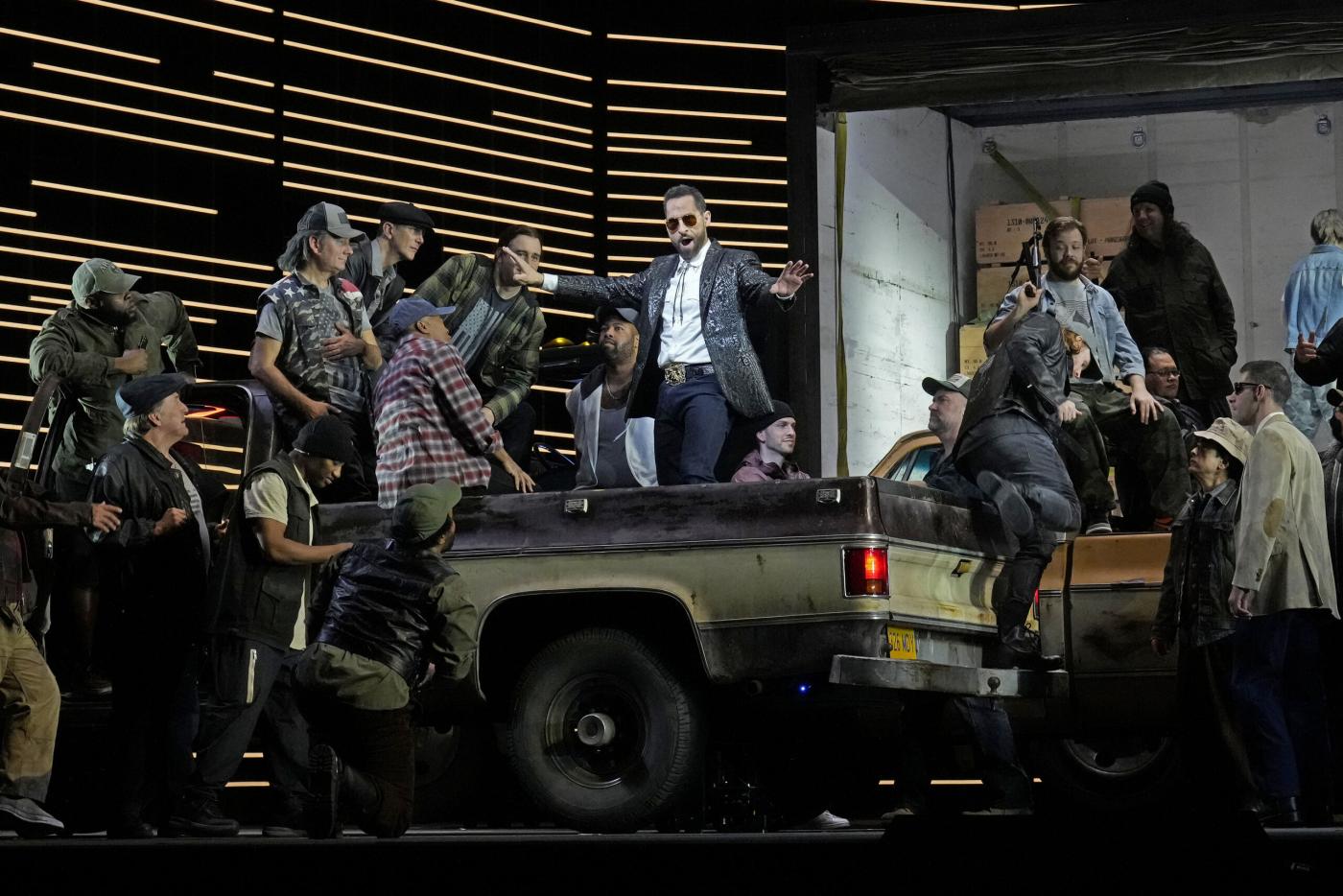PBS Great Performances series is a wonderful way to experience high-level artistic performances from our own personal screens. The series continues with “Great Performances at the Met: Carmen”, a recorded performance from the Metropolitan Opera’s production of Georges Bizet’s fiery classic presented earlier this year. WETA PBS and WETA Metro are delighted to premiere this performance on Friday, June 14, 2024 at 9:00 pm (ET). Check program listings for subsequent broadcasts.
To enhance our enjoyment of this presentation, we provide a brief description of the opera, followed by a synopsis of each Act.
Nearly 150 years after its premiere, Carmen remains a time-honored favorite, full of passion, power and drama, and remarkable in its innovation. Instead of a traditional moralistic plot centering on noble, upper-class characters, Carmen is verismo opera, a 19th century style that focused on common people, often working class and peasants, who face real-life situations. Cavalleria rusticana by Mascagni, Pagliacci by Leoncavallo and Puccini’s Tosca are all examples of verismo opera. The story is based on a novella of the same name by the 19th century writer Prosper Mérimée.
In Carmen, Bizet gave voice to the underclass and underworld -- those characterized as gypsies, smugglers, factory workers, street merchants and various ne’er-do-wells. And liberated, working women smoking cigarettes scandalized and shocked audiences when Carmen premiered in Paris in 1875. Bizet despaired at the criticism and died just months after its premiere, convinced he had written a failure. Tchaikovsky, however, recognized its value early on, saying “Ten years from now, Carmen will be the most popular opera in the world”.
The story is set outside of Seville, Spain. The fiery temptress, Carmen, commands attention from the start, elusively responding to soldiers’ pleas for her love in a habanera, in which she equates love to a rebellious bird. The vulnerable and naïve soldier, Don José, is seduced by Carmen and becomes obsessed with her, even as she teases and ridicules him. Don José’s career is ruined by his passionate love for Carmen, and he faces a hot-blooded rivalry with the charismatic bullfighter, Escamillo, who also vies for Carmen’s affections. The men’s intense rivalry gives way to a heated struggle and ultimately, murder.
The music of Carmen is rooted in the musical forms of the Spanish region where the opera is set. Bizet's diligence research coupled with his creativity infuse the opera with regional rhythms and bewitching melodies. In addition to the Habanera, the opera includes the well-known Toréador Song and the Seguidilla, a form of traditional Castilian folksong. There are moments of tenderness, too: the heartfelt aria, “Je dis que rien ne m'epouvante” sung by the peasant girl Micaela, who prays for strength to rescue Don Jose from Carmen, and Don Jose’s aria, "La fleur que tu m'avais jetée", in which he asserts his love for Carmen even as she mocks him.
This Metropolitan Opera presentation of Carmen, a new production from January 2024, is set in modern day. The opera’s dramatic issues – violence, class divisions and labor struggles – remain as relevant today as in Bizet’s time. Mezzo-soprano Aigul Akhmetshina stars as Carmen, and the cast also includes tenor Piotr Beczala as Don José, soprano Angel Blue as Micaela, and bass baritone Kyle Ketelsen as the swaggering toreador, Escamllo. Daniele Rustioni conducts Bizet’s heart-pounding score.
Enjoy this special Metropolitan Opera presentation with us.
Act I
In a town square, soldiers parade as young women, including Carmen, emerge from their work in a cigarette factory. The men mingle with the women. Many seek Carmen’s attention, but she has a cynical view of love, as she sings in the habanera, “L’amour est un oiseau rebelle” (“Love is a rebellious bird”), while throwing a to the soldier Don José. The peasant girl Micaëla gives Don José a letter from his mother, in which she asks him to return home to marry Micaëla. Then an uproar, as Carmen is accused of fighting with another girl and drawing a knife. Carmen refuses to respond to officer Zuniga’s investigation so he decides to send her to prison. While Don José ties Carmen’s hands, she seduces him with a seguidilla. Bewitched, he lets her escape.
Act II
Two months later, Carmen and her friends, Frasquita and Mercédès, entertain officers Zuniga and Moralès. The crowd welcomes the famous bullfighter Escamillo, and he sings the famous “Toreador Song”. He notices Carmen, but she rejects him. The smugglers Dancaire and Remendado tell the women of their plans to hide some contraband in the mountains. Frasquita and Mercédès are eager to help them, but Carmen refuses because she has fallen in love with Don José and wishes to wait for him. He returns and states his love for her. Carmen dances for him, but a bugle calls him back to duty. He is conflicted between his military obligations and Carmen, but decides to answer the soldiers’ call. Carmen is angered and ridicules Don José for leaving. In his aria, “La fleur que tu m'avais jetée”, he expresses his undying passion for Carmen, remembering the flower she threw to him months earlier. Zuniga, Don José’s superior officer, enters to search for Carmen. Jealous, Don José fights with Zuniga over Carmen. He realizes that he has ruined his career by fighting with Zuniga, so believes he now has no choice but to join the smugglers.
Act III
Carmen and Don José join the smugglers at the border. Carmen has grown tired of Don José but he is still obsessed with her. He remains with the smugglers while Carmen joins Frasquita and Mercédès, who play fortune-telling cards that predict Carmen’s death. Micaëla arrives to search for Don José; she wants to rescue him from Carmen. In her famous aria, “Je dis que rien ne m'epouvante”, Micaëla asserts that nothing will frighten her, yet prays for divine guidance. She hides as she watches Don José fight the toreador Escamillo over Carmen. The men are interrupted by the women, and as Escamillo leaves, he invites them to his next bullfight. Micaëla begs Don José to go with her. He is hesitant because he still longs for Carmen, but finally agrees to go visit his dying mother, while vying to return.
Act IV
A crowd has gathered outside the bullring for the bullfight. The toreador, Escamillo, arrives with Carmen, now his lover. The desperate Don José begs Carmen to return to him, but she contemptuously rejects him and tosses the ring he gave her. In fury, Don José stabs Carmen just as the crowd inside the bullring cheers for Escamillo. In his grief, Don José calls out, “Ah! Carmen! Ma Carmen, ma adorée!”
PBS PASSPORT
Stream tens of thousands of hours of your PBS and local favorites with WETA+ and PBS Passport whenever and wherever you want. Catch up on a single episode or binge-watch full seasons before they air on TV.

